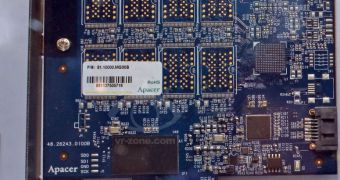PCI Express solid state drives weren't easy to use at first, since they lacked boot support, but they eventually overcame that limitation.
Now, the drives are gaining caching technology support too. For those unaware, Intel Smart Response technology, and similar solutions, make a PC think an HDD and an SSD are part of the same device.
This allows for system/often used files to be stored, and for data to be copied, on the SSD before being transferred to the HDD part, through a background process.
Essentially, this combines the capacity and speed benefits of HDDs and SSDs, respectively.
Apacer has reportedly revealed the PHFD cache-SSD, a full-height PCI Express 2.0 x1 add-in board.
It is the sort of device that actually has the purpose of serving computers without Intel RST.
And by RST, we mean Intel Rapid Storage technology, not Smart Response.
Apacer's PHFD possesses the HyperDuo technology, an alternative to RST that does the caching and that is included in the controller chip.
Speaking of which, the SSD is run by the Marvell 88SE9130 2-port SATA 6.0 Gbps chip, or a similar unit.
One of the two SATA ports is wired to the 32 GB SSD subunit, while the other is used for establishing the link to whatever HDD (hard disk drive) the system boasts.
There was no price or availability date given in the report, but we suspect Apacer will want to ship this thing as soon as possible.
Not only does the NAND Flash market not have any time to waste, but speed is essential if prospective buyers are to have enough time to see all the factors that may help them decide against buying a more familiar 2.5-inch, standard drive instead.
Apacer will probably have versions of the PHFD with more than 32 GB capacity. This is only conjecture at this point though.

 14 DAY TRIAL //
14 DAY TRIAL //